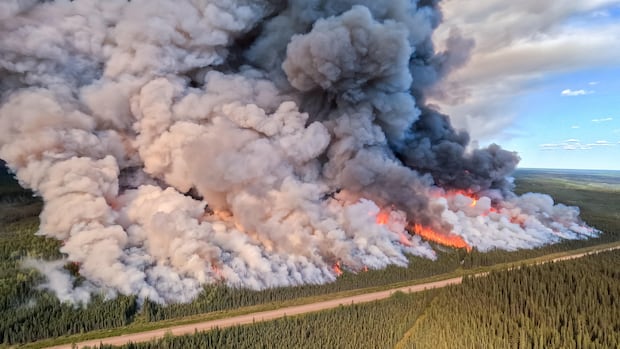Like many people from Serpent River First Nation, along the north shore of Lake Huron, Jenifer Brousseau often picks berries and traditional medicines in the bush around her community in northeastern Ontario.
But in recent years, Brousseau and many others from Serpent River have been concerned about the forestry industry’s use of herbicides that contain the chemical glyphosate.
“It’s kind of scary because I don’t know where I can gather anymore,” she said.
“I have to be very mindful, of like, has there been forestry here? Are they gonna be spraying here? How close to here have they sprayed?”
Glyphosate is sold to forestry companies under the trade name Vision, but is most commonly known by the general public under Monsanto’s trademark Roundup.
Glyphosate works by interfering with amino acid synthesis in plants, and is used to kill weeds and broadleaf vegetation.
In late summer, forestry companies spray herbicides on thousands of hectares of Crown land across northern Ontario. The goal is to promote growth of the tree they harvest, such as jack pine, by inhibiting the development of other plants that would compete with those trees.
Glyphosate is the most widely used herbicide in Canada and was last reviewed for use by Health Canada in 2017.
At that time, Health Canada concluded “the levels of glyphosate to which people living in Canada may be exposed do not cause any harmful effects when glyphosate-containing products are used properly according to product label instructions.”
Health Canada’s assessment also goes on to say, “Overexposure to glyphosate products may lead to skin and eye irritation, nausea and vomiting, and respiratory effects such as nose irritation and asthma in workers and others, if label directions are not followed.”
Legal challenge against Health Canada
Environmental groups — including Friends of the Earth Canada, the David Suzuki Foundation, Safe Food Matters and Environmental Defence Canada — have launched a court challenge of Health Canada’s conclusions on glyphosate.
They argue the federal department’s reassessment is based on outdated science. The International Agency for Research on Cancer, for example, says that glyphosate is “probably carcinogenic to humans.”
Group holds demonstration against glysophate use in northern Ontario
People opposed to aerial herbicide use by the forestry industry met this morning in Serpent River First Nation to demonstrate against the practice and urge the province to step in before spraying starts again later this month. CBC’s Jonathan Migneault was there and brings us a conversation from the protest with Elder Allan McDonald
When asked about various groups asking for a ban on the use of glyphosate-based herbicides in forestry, the provincial Ministry of Natural Resources referenced Health Canada’s approval of the chemical.
For Brousseau and others from her community who gather plants from the forest, that’s worrying.
Brousseau was part of a rally on Thursday, when about 100 people from Serpent River First Nation and other nearby First Nations called for the Ministry of Natural Resources to disallow glyphosate use in forestry.
Quebec banned use of herbicides containing glyphosate on its Crown land forests in 2001.
“And they seem to be doing OK. So why is it that Ontario can’t follow suit?” asked Allan McDonald, an elder from Garden River First Nation, located near Sault Ste. Marie.
McDonald is a member of Traditional Ecological Knowledge (TEK) Elders, one of the lead groups that organized the protest in Serpent River First Nation, along Highway 17.
TEK member Grace Manitowabi, from Sagamok First Nation, said glyphosate spraying kills traditional medicines — including sage, sweetgrace and cedar — that are important to people in her community.
“And not to mention the blueberries are all dead now,” she said.
Manitowabi said moose harvested by community members have been found with various cancers, and she’s concerned they may be related to glyphosate-based herbicides.
Some small municipalities in northern Ontario have also started to petition the province in their effort to get the ban.
At a council meeting on Aug. 7, councillors in Moonbeam township passed a motion that called for the provincial and federal governments to “take immediate action to end the aerial spraying of glyphosate.”

Municipalities call for a ban
Moonbeam Mayor Luc Léonard told CBC News that residents are concerned about winds blowing herbicide spray from nearby Crown land and into the municipality.
“Since the wind will carry everything around, I would like for the Crown land around my area to be included in this motion.”
Jennifer Lynn Cutting has a hobby farm in Moonbeam and said she’s concerned about herbicides landing on her property.
“I really don’t want to leave earth full of chemicals and environmental disasters to my children, my grandchildren, my great-grandchildren,” she said.
“If anything happened and got into our water, we would be drinking it ourselves,” she said.
In an open letter to Ontario Minister of Natural Resources Mike Harris Jr., Nickel Belt MPP France Gélinas asked the ministry to suspend aerial spraying of herbicides containing glyphosate in her area.
“There is a glaring absence of independent, region-specific research on the effects of glyphosate in northern Ontario,” her open letter said.
“Indigenous knowledge holders have reported environmental changes consistent with herbicide spraying, yet these observations have not been meaningfully incorporated into provincial decision-making.”
The municipality of West Nipissing, located between North Bay and Sudbury, is calling for a moratorium on glyphosate spraying on Crown land until the science can catch up.
“There hasn’t really been significant research published since 2017 from the government of Canada,” West Nipissing Mayor Kathleen Thorne Rochon told Radio-Canada.
“And that since then, you know, there have been concerns that glyphosate is carcinogenic, and the other impacts on both human health and environmental health.”
Rochon said she believes forestry companies would be receptive to conversations about their use of herbicides and alternatives.
“The companies that are harvesting for forestry use have a vested interest in sustainable forestry management,” she said.
“I don’t believe that these companies are actually operating on a, ‘Who cares what happens to the environment as long as we make money.'”
Herbicides part of a toolbox
Fred Pinto is an adjunct professor of forestry at the University of Toronto and a former executive director of the Ontario Professional Foresters Association.
He said herbicides are just one tool used by forestry companies to manage vegetation.
Other techniques include controlled burns and the mechanical removal of plants (where they are weeded by hand or with machinery).
Pinto said herbicide spraying is often done using aircraft in areas that have little to no road access.
Other forest management techniques also have their downsides, so forestry companies carefully consider each tool depending on the situation, he said.
Controlled burns, for example, release smoke into the atmosphere and place workers in areas that can impact their health. Some species also re-sprout right away after they are weeded by hand, which makes mechanical forest management less effective in some cases.
Pinto said foresters are also mandated to apply for permits with the province and alert the public in affected areas before spraying. Access to those forested areas is cut off when the spraying occurs.
Pinto welcomes the public discourse on the use of glyphosates.
“It’s fine for people to question things. We learn from that,” he said.”You know, there have been some errors in the past where new information or information that was not complete was used.”






